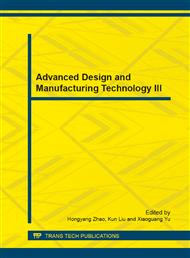p.1278
p.1282
p.1286
p.1291
p.1296
p.1304
p.1309
p.1314
p.1317
The Optimization of the PID Controller Using the Least Squares Method and the Improved Lbest PSO Algorithm
Abstract:
A self-adaptive PID tuning scheme is presented for the electro-hydraulic servo loading system. It requires the least squares method to identify the parameters of the transfer function of the electro-hydraulic servo loading system and utilizes the improved lbest PSO algorithm to optimize the PID controller. The scheme can provide the optimal PID parameters so that the dynamic performance and stability of the electro-hydraulic servo loading system are improved. Results show the fact that the dynamic performance and stability of the system are improved by the scheme. And in terms of optimization of PID controller, the improved lbest PSO algorithm is better than the lbest PSO algorithm and Ziegler-Nichols method.
Info:
Periodical:
Pages:
1296-1303
Citation:
Online since:
September 2013
Authors:
Price:
Сopyright:
© 2013 Trans Tech Publications Ltd. All Rights Reserved
Share:
Citation:


